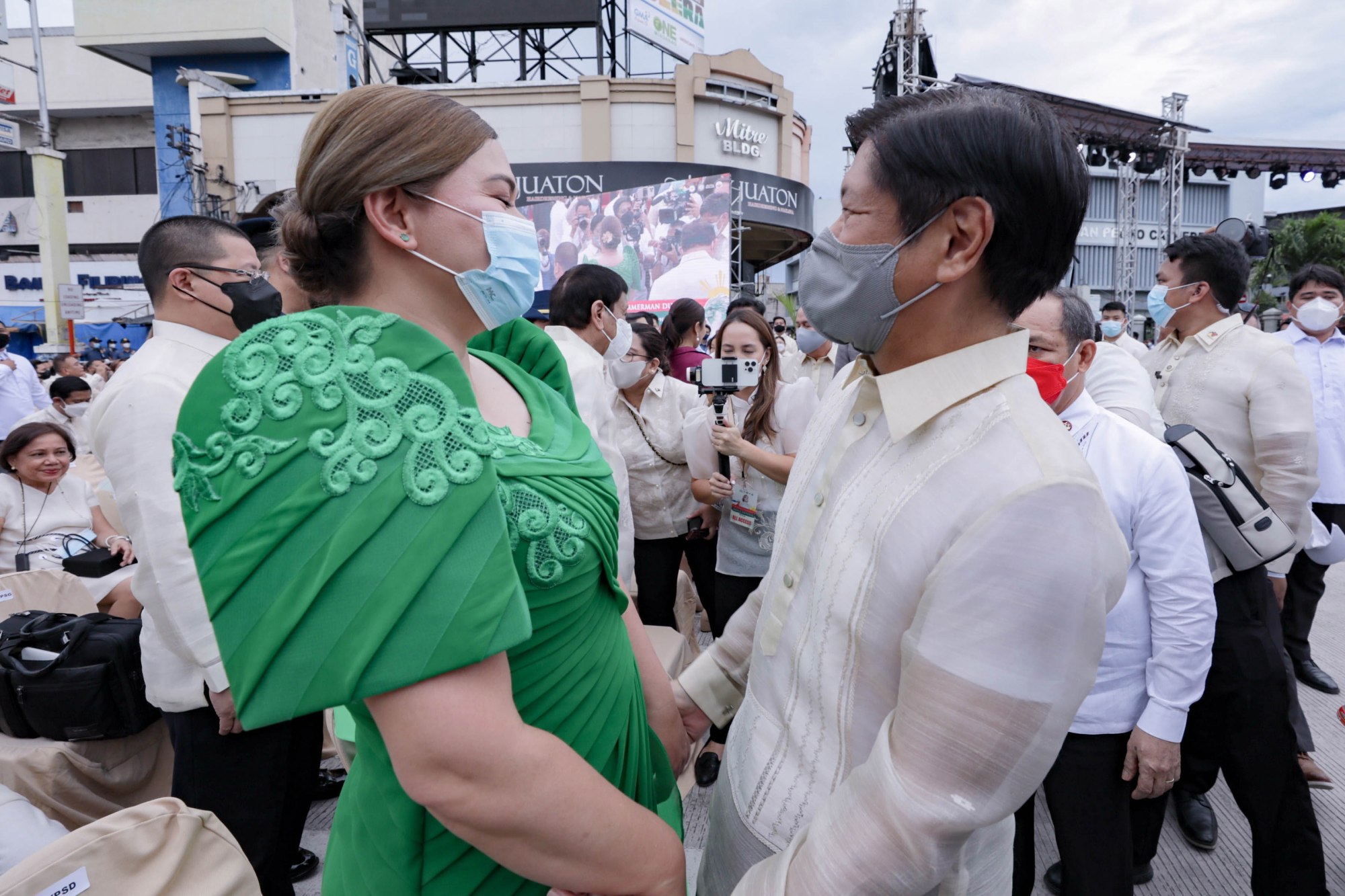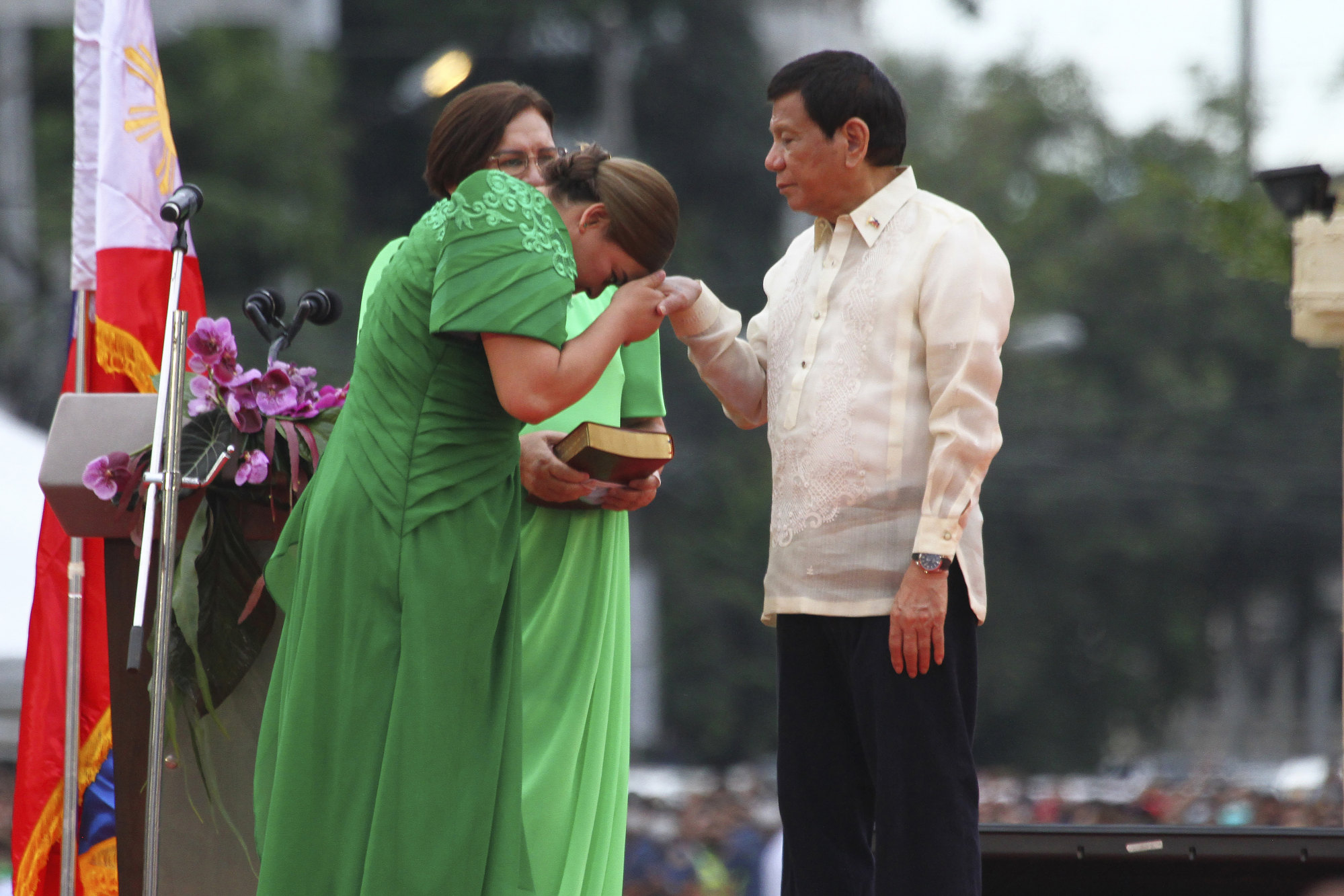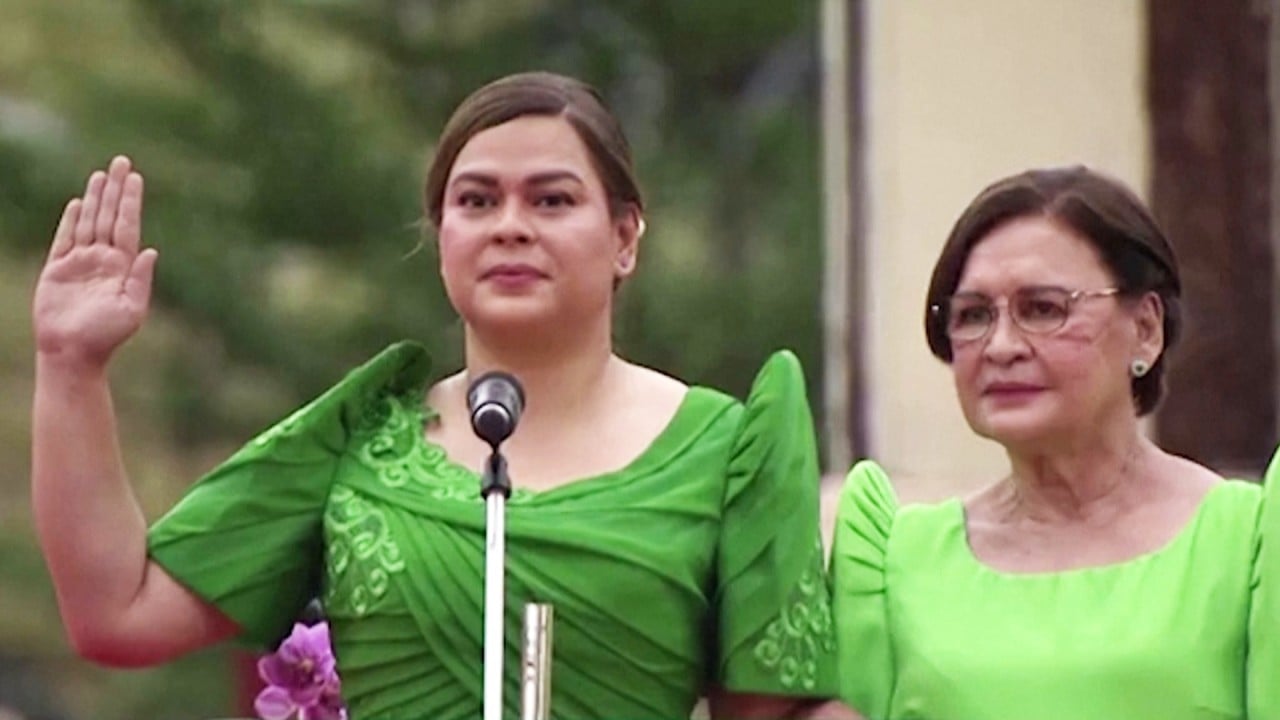
Should Philippines’ Marcos be ‘on guard’ as Sara Duterte is sworn in early, meets China envoy?
- The VP-elect’s move to take her oath 11 days early, in a ceremony attended by diplomats including China’s ambassador, shows she remains a ‘force’ beyond her office, analysts say
- It comes as President-elect Marcos still faces some Supreme Court cases that may nullify his participation in the election, while some observers have said the alliance between the two looks ‘quite fragile’
Under the 1987 constitution, the vice-president’s function is to serve as an immediate successor if the president dies or becomes incapacitated during the six-year tenure, which always ends at 12pm on June 30.
Because of this, the vice-president is traditionally sworn in minutes “before the president-elect, who takes the oath as close to noon as possible”, historian Manolo Quezon said.
He regarded Duterte-Carpio’s decision to break protocol by taking her oath 11 days early as “a statement … a reminder she is a (political) force”.
In an indication of her clout, the two-hour ceremony in Davao City was attended by a number of unnamed foreign envoys, including Chinese ambassador Huang Xilian, who had met Duterte-Carpio the day before.
“We exchanged views on the longtime China-Philippines friendship and envisioned a better future for our bilateral relations,” he wrote on his Facebook page. “I briefed her about the substantive and positive progress of the Samal Island-Davao City Connector Project, which was supported by a Chinese concessional loan of approximately US$350 million.”
Huang on Saturday also met her youngest brother Sebastian, who replaced her as mayor of Davao City. The ambassador said he handed over “13 school buildings (worth 150 million pesos) … a donation from the Chinese embassy with a purpose to provide a better educational environment for Davao students”.
“As a good friend and partner of the Philippines, we stand ready to work closely with H.E. Sara Duterte and Hon. Sebastian Duterte in the spirit of Bayanihan to contribute to Davao’s economic recovery and livelihood, and continuously promote friendship between our two countries to bring more benefits to our two peoples,” Huang wrote on Sunday after the inauguration ceremony, referring to the Filipino word that means “community”.
Marcos says he’ll assert Philippines’ South China Sea rights ‘with a firm voice’
Huang’s meetings and donations came as President-elect Ferdinand Marcos Jnr announced a recent turnaround in his policy on the disputed South China Sea.
Before the election, Marcos had vowed continued friendship and commerce with China but dismissed the ruling. On May 26 however, he declared he would uphold the United Nation’s 2016 arbitral ruling which nullified Beijing’s claims in the waterway via a “nine-dash line”.
“There is no wiggle room there. Our sovereignty is sacred. We will not compromise it in any way,” he said. “We do not need to be told by anyone how to run our own country.”
Political science professor Jean Franco from the University of the Philippines criticised Duterte-Carpio’s self-styled inauguration, saying protocols for such events were “very important in terms of (conveying) continuity” and thus should not be “subjected to the whims and caprices” of any individual.
“The President and the Vice-President-elect should not be bigger than the position they are going to sit on,” she said.

‘Fragile’ alliance
Duterte-Carpio replaces current vice-president Leni Robredo, who lost her bid for the top job to President-elect Marcos. She took her oath at the Supreme Court before Associate Justice Ramon Paul Hernando, her former law professor.
In a 12-minute speech, she called her life “a testament to the power of a God”. “We can never go wrong if we are a people dedicated to honouring the will of God, to serving our country and our fellowmen, and protecting the integrity of our families and the future of our children,” she said. It was a marked departure from her father’s pronouncements that God was “stupid”.
While some of Duterte-Carpio’s supporters had been celebrating the start of her tenure, retired supreme court associate justice Antonio Carpio said that was premature as the oath would take effect “only upon the official start of their terms of office”. “So she cannot claim, as her supporters are now claiming, that she’s (now) the VP,” he said.

Franco observed that the first non-family member whom Duterte-Carpio welcomed onstage for a photo after her oath-taking was former President Gloria Macapagal-Arroyo, not President-elect Marcos.
When Marcos, his wife Louise, sister Imee and son Sandro came onstage, he was all smiles and later told ABS-CBN News: “I am so proud of her. She’s gonna be great. She will do a great job. I know it.”
Marcos had made Duterte-Carpio the education secretary even though she had repeatedly requested to head the Department of National Defence.
Senator Imee Marcos separately told ABS-CBN that the Duterte family could “count on [the Marcoses] for life”, a statement that ignored the fact that Sara’s grandfather, Vicente, had been abandoned by Marcos Snr during the latter’s bid to run as Davao governor.
What does a Marcos Jnr presidency mean for Asean and democracy in the region?
Franco said the Duterte-Marcos alliance looked “quite fragile” and added that similar alliances in the past were usually “quite temporary, especially for election purposes”.
She pointed out that it was Duterte-Carpio who had carried Marcos to victory, using her popular father’s political base. She won 32.2 million votes, equivalent to 61.5 per cent of total votes cast, while Marcos won 31.6 million votes, with a vote share of 58.7 per cent.
Still, historian Quezon said that while the separate oath-taking had no implications on the power relationship between Duterte-Carpio and President-elect Marcos, it did “keep speculation alive”.
“Marcos has to be on guard because of talk about his being disqualified, because the traditions are so well-established though the Dutertes continue to deviate,” he said.
Marcos Jnr chooses stability in naming cabinet to restore economy, family name
Quezon was referring to the fact that several cases were still pending before the Supreme Court to disqualify Marcos’ participation in the presidential race or to cancel his certificate of candidacy. The Commission on Elections (Comelec) had earlier thrown out these cases, enabling Marcos to run for office, but the original petitioners had appealed the poll body’s decision before the high court.
If the court sides with Comelec, then Marcos would be free to take office. If the court sides with the petitioners before June 30, then the presidential candidate with the next-highest votes – Robredo – would be declared winner.
If the court sides with the petitioners but issues its decision after June 30 however, then Duterte-Carpio will become president, retired justice Carpio previously told This Week in Asia.


